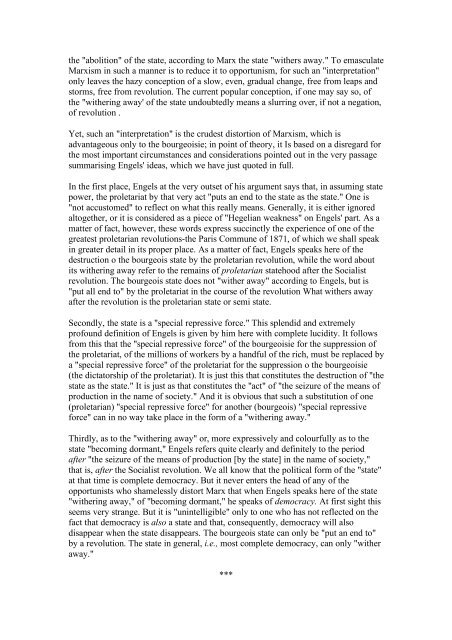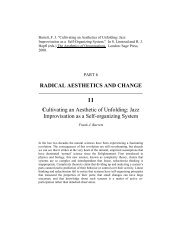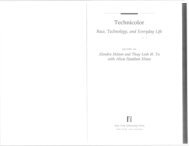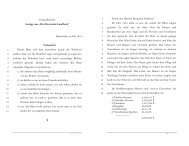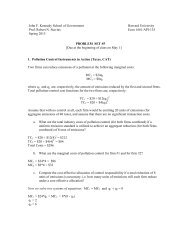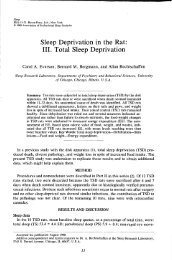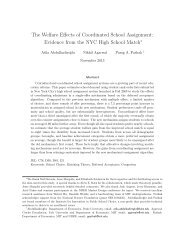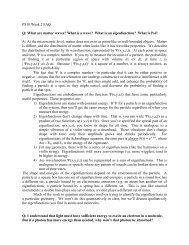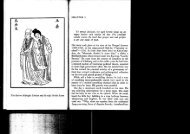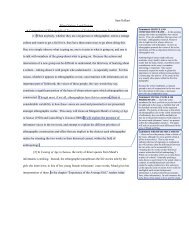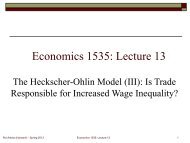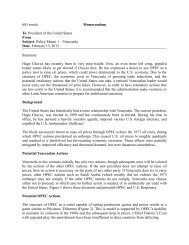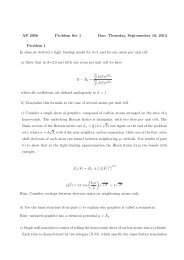Vladimir Illyich Lenin: State and Revolution, 1918 - iSites
Vladimir Illyich Lenin: State and Revolution, 1918 - iSites
Vladimir Illyich Lenin: State and Revolution, 1918 - iSites
Create successful ePaper yourself
Turn your PDF publications into a flip-book with our unique Google optimized e-Paper software.
the "abolition" of the state, according to Marx the state "withers away." To emasculate<br />
Marxism in such a manner is to reduce it to opportunism, for such an "interpretation"<br />
only leaves the hazy conception of a slow, even, gradual change, free from leaps <strong>and</strong><br />
storms, free from revolution. The current popular conception, if one may say so, of<br />
the "withering away' of the state undoubtedly means a slurring over, if not a negation,<br />
of revolution .<br />
Yet, such an "interpretation" is the crudest distortion of Marxism, which is<br />
advantageous only to the bourgeoisie; in point of theory, it Is based on a disregard for<br />
the most important circumstances <strong>and</strong> considerations pointed out in the very passage<br />
summarising Engels' ideas, which we have just quoted in full.<br />
In the first place, Engels at the very outset of his argument says that, in assuming state<br />
power, the proletariat by that very act "puts an end to the state as the state." One is<br />
"not accustomed" to reflect on what this really means. Generally, it is either ignored<br />
altogether, or it is considered as a piece of "Hegelian weakness" on Engels' part. As a<br />
matter of fact, however, these words express succinctly the experience of one of the<br />
greatest proletarian revolutions-the Paris Commune of 1871, of which we shall speak<br />
in greater detail in its proper place. As a matter of fact, Engels speaks here of the<br />
destruction o the bourgeois state by the proletarian revolution, while the word about<br />
its withering away refer to the remains of proletarian statehood after the Socialist<br />
revolution. The bourgeois state does not "wither away" according to Engels, but is<br />
"put all end to" by the proletariat in the course of the revolution What withers away<br />
after the revolution is the proletarian state or semi state.<br />
Secondly, the state is a "special repressive force." This splendid <strong>and</strong> extremely<br />
profound definition of Engels is given by him here with complete lucidity. It follows<br />
from this that the "special repressive force" of the bourgeoisie for the suppression of<br />
the proletariat, of the millions of workers by a h<strong>and</strong>ful of the rich, must be replaced by<br />
a "special repressive force" of the proletariat for the suppression o the bourgeoisie<br />
(the dictatorship of the proletariat). It is just this that constitutes the destruction of "the<br />
state as the state." It is just as that constitutes the "act" of "the seizure of the means of<br />
production in the name of society." And it is obvious that such a substitution of one<br />
(proletarian) "special repressive force" for another (bourgeois) "special repressive<br />
force" can in no way take place in the form of a "withering away."<br />
Thirdly, as to the "withering away" or, more expressively <strong>and</strong> colourfully as to the<br />
state "becoming dormant," Engels refers quite clearly <strong>and</strong> definitely to the period<br />
after "the seizure of the means of production [by the state] in the name of society,"<br />
that is, after the Socialist revolution. We all know that the political form of the "state"<br />
at that time is complete democracy. But it never enters the head of any of the<br />
opportunists who shamelessly distort Marx that when Engels speaks here of the state<br />
"withering away," of "becoming dormant," he speaks of democracy. At first sight this<br />
seems very strange. But it is "unintelligible" only to one who has not reflected on the<br />
fact that democracy is also a state <strong>and</strong> that, consequently, democracy will also<br />
disappear when the state disappears. The bourgeois state can only be "put an end to"<br />
by a revolution. The state in general, i.e., most complete democracy, can only "wither<br />
away."<br />
***


